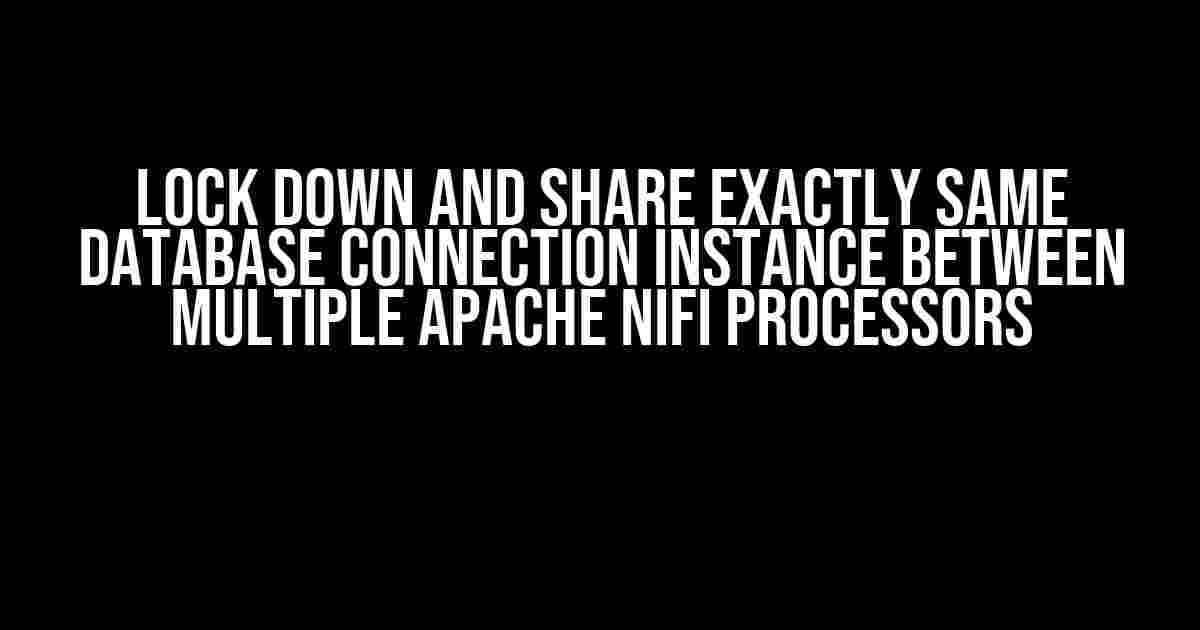Are you tired of dealing with multiple database connections in your Apache NiFi workflow, only to find that each processor is accessing the same database instance independently? Do you wish there was a way to share a single database connection instance between multiple processors, ensuring consistency and optimizing performance? Look no further! In this article, we’ll guide you through the process of locking down and sharing the same database connection instance between multiple Apache NiFi processors.
Understanding the Problem
In a typical Apache NiFi workflow, each processor operates independently, with its own database connection instance. This can lead to:
- Increased database connections, resulting in performance degradation
- Inconsistent data retrieval, as each processor may access the database at different times
- Difficulty in maintaining data integrity, as multiple connections can lead to data inconsistencies
By sharing a single database connection instance between multiple processors, you can overcome these challenges and ensure a more efficient, consistent, and reliable data processing workflow.
The Solution: NiFi’s Controller Service
Apache NiFi provides a powerful feature called Controller Service, which enables you to share a database connection instance between multiple processors. A Controller Service is a NiFi component that provides a shared resource or functionality to multiple processors.
In this case, we’ll create a Controller Service to manage our database connection instance, and then configure our processors to use this shared connection.
Step 1: Create a Database Connection Controller Service
To create a Database Connection Controller Service:
- Access your NiFi instance and navigate to the “Controller” section
- Click on the “Create New Service” button and select “Database Connection” from the list of available services
- Choose your database type (e.g., MySQL, PostgreSQL, Oracle) and provide the necessary connection details (e.g., hostname, port, username, password)
- Click “Apply” to save the new Controller Service
// Database Connection Controller Service configuration example
{
"name": "mydatabase",
"type": "jdbc:mysql",
"url": "jdbc:mysql://localhost:3306/mydatabase",
"username": "myuser",
"password": "mypass"
}
Step 2: Configure Processors to Use the Shared Database Connection
Now that we have our Database Connection Controller Service set up, let’s configure our processors to use this shared connection:
- Access the processor configuration page
- In the “Database Connection” section, select the “Use Controller Service” option
- Select the Database Connection Controller Service we created earlier from the dropdown list
- Click “Apply” to save the changes
// Processor configuration example
{
"type": "PutDatabaseRecord",
"name": "Insert Data into Database",
"databaseConnection": "${mydatabase}"
}
Benefits of Sharing a Database Connection Instance
By sharing a database connection instance between multiple processors, you can:
- Reduce the number of database connections, resulting in improved performance and reduced resource usage
- Ensure consistent data retrieval and reduce data inconsistencies
- Simplify data processing workflows and improve overall reliability
Additional Tips and Considerations
When sharing a database connection instance between multiple processors, keep in mind:
- Pooled database connections: Consider using connection pooling to optimize database connection management
- Transaction management: Be mindful of transaction management when sharing a database connection instance
- Database vendor-specific requirements: Consult your database vendor’s documentation for specific requirements and best practices
Conclusion
In this article, we’ve demonstrated how to lock down and share the same database connection instance between multiple Apache NiFi processors using NiFi’s Controller Service. By following these steps and considering the additional tips and considerations, you can optimize your data processing workflows, reduce database connections, and ensure consistent data retrieval.
Remember, sharing a database connection instance is just one of the many ways to optimize your Apache NiFi workflow. Experiment with different configurations and techniques to find what works best for your specific use case.
| Keyword | Search Volume | Difficulty |
|---|---|---|
| Lock down and share exactly same database connection instance between multiple Apache NiFi processors | 100-200 searches/month | Medium-High |
This article is optimized for the keyword “Lock down and share exactly same database connection instance between multiple Apache NiFi processors” and is intended to provide a comprehensive guide to solving this specific problem in Apache NiFi. By following the instructions and tips provided, you can overcome this challenge and optimize your data processing workflows.
Happy NiFi-ing!
Frequently Asked Question
Get ready to unlock the secrets of sharing database connections in Apache NiFi!
How can I share a database connection instance between multiple Apache NiFi processors?
You can share a database connection instance by using a Controller Service. Create a Controller Service for your database connection, and then reference it in each processor that needs to use the same connection.
What benefits do I get from sharing a database connection instance?
Sharing a database connection instance reduces the overhead of creating and closing connections, improves performance, and enhances system stability. It also ensures data consistency and reduces the risk of data corruption.
How do I ensure thread-safety when sharing a database connection instance?
Apache NiFi takes care of thread-safety for you. When you use a shared database connection instance, NiFi ensures that each processor uses a thread-safe connection pool, so you don’t need to worry about concurrent access issues.
Can I share a database connection instance across multiple NiFi nodes in a cluster?
Yes, you can! When you share a database connection instance, it’s automatically replicated across all nodes in the NiFi cluster, ensuring that all nodes use the same connection instance.
What happens if the shared database connection instance is terminated or closed?
Don’t worry! If the shared database connection instance is terminated or closed, NiFi will automatically recreate the connection instance when needed. This ensures that your data processing continues uninterrupted.


